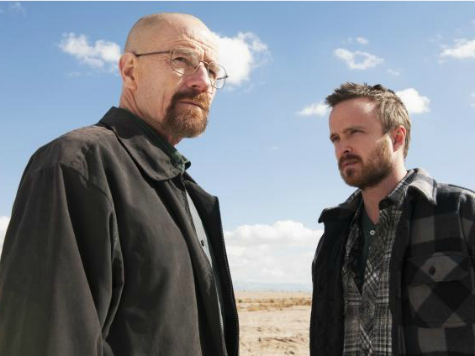
**SPOILERS**
Over on The Conversation, there has already been some very smart analysis of last Sunday night’s series finale of “Breaking Bad,” and I am not here to argue with anyone over something as subjective as what an individual wants or needs from a television show. There is no right or wrong here. I was just happy to see that what almost everyone predicted would happen … didn’t.
Personally, the finale shocked, moved, and thrilled me. From where I sit, series creator Vince Gilligan made all the right choices, including, yes, the decision to give Walt a touch of redemption. The scene between Walt and Skyler in which he finally admits that what he did he did for himself was poetry — a long time coming, and absolutely true to the character.
The reality of “Breaking Bad” is that Walter White is our hero, our protagonist, the man we are going on a journey with and frequently rooting for, oftentimes against our better judgment. Okay, technically, Walt is an anti-hero, but that is all semantics.
Gilligan could have closed the series the previous week, before Walt ever left his dismal cabin and saw Gretchen and Eliot on television. Gilligan could have left our hero in that shitty cabin, lonely and slowly dying. And so we would have also left Jesse a meth slave, Skyler a taxi dispatcher–probably on her way to jail, Walt’s two innocent kids screwed, and Marie without the closure of being able to bury Hank.
No, no, no, no, no, no….
Where is the lesson in that? Did we really spend five years with this man just to see him get his comeuppance and to be left with the simplistic theme that crime doesn’t pay?
Again and again people describe “Breaking Bad” as “Mr. Chips becomes Scarface.” Fair enough. But don’t forget that at the end of “Scarface,” Tony Montana redeems himself. Why is Tony gunned down in his home by an army of drug dealers? Because Tony chose not to kill two innocent children who would have been collateral damage in an assassination attempt. Tony knew the consequence of that decision and still chose to risk his drug empire and his life.
Tony Montana was capable of evil, but he was not pure evil. And like Walt’s Nazis, Tony was our protagonist anti-hero because the story contained an antagonist who actually was pure evil.
Similarly, what we learned Sunday night is that, while Walt was most certainly capable of evil, he was not pure evil. And that is what I found satisfying and moving.
While drinking what he thought was his last Scotch, and after learning that his beloved son wished him dead — when staring into the The Abyss, the end — something snapped in Walt, and it was not the murderous rampage we thought. Gretchen and Eliot dismissing him on Charlie Rose didn’t push a button that turned Walt into the Terminator; it pushed the button we’ve seen pushed many times: that of the cunning chess player who can see ten moves ahead of the rest of the world to get what he wants.
And it was his devastating phone call with Flynn that woke up that part of Walt that is not Heisenberg.
Our hero had a journey to complete. Part of that journey was accomplishing his stated goals (providing for his family). But in the classic storytelling sense, the other part had to do with Walt’s personal journey.
If there is a more apt comparison to Walt, it isn’t Scarface; it is Colonel Nicholson (Alec Guinness) in “Bridge on the River Kwai” — another man who loses himself in a “good deed” and only comes to his senses when certain death has embraced him.
So, it turns out that “Breaking Bad” wasn’t about how an embittered sad sack turns evil; it was about something more complicated than the nihilistic message of “it was all so pointless.”
Instead, Gilligan reminded us that life has meaning, and that as flawed, wicked, and prideful as we can be, there is always time to come to our senses and to give your life meaning.
I did not go on a five-year journey with Walter, Jesse, Hank, Skylar, Flynn and Marie to see it fail or to be told it was all for nothing. And I am very satisfied with a story that showed a man lose his humanity and then regain it when he realized he was out of time.
One complaint about the finale that I do want to address directly is the idea that it was “too neat,” that all the loose ends were too perfectly tied up. That is not my sense at all. Jesse is in the ether, Lydia’s child is an orphan, Flynn and Skylar might be wealthy some day, but the emotional wreckage is and will forever be profound; the brittle, fragile Marie is a widow; and Skylar could not only do jail time but has to live with her role in the criminal enterprise that exploded her family–she has to live with terrible secrets.
If he is lucky, Walt is in Purgatory, and in a way, so are those he left behind. The lives of these characters will go on long after the finale’s final fade, and those are lives that will be forever filled with emotional tripwires and unexploded secrets.
There is nothing neat about that.
In Sunday’s finale, Heisenberg’s cunning met with Walt’s humanity; the duality of this character finally came together.
Hell, yes, that was satisfying, and perfect.
NOTE: This essay is late, sorry.
Follow John Nolte on Twitter @NolteNC

COMMENTS
Please let us know if you're having issues with commenting.